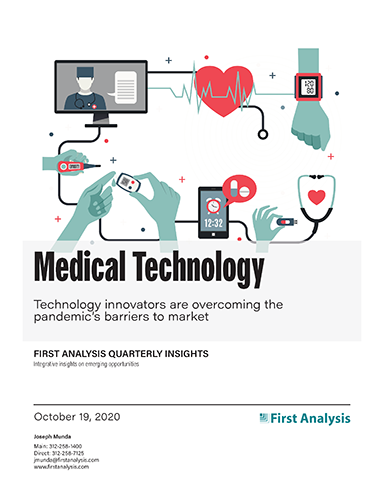Quarterly insights: Medical technology
Technology innovators are overcoming the pandemic’s barriers to market

Medical procedures are resuming following the two-month suspension early during the pandemic that saw the U.S. surgical cancellation and reschedule rate surge to 88%. By late July, the cancellation rate had subsided to 28%, within the normal 25% to 30% range.
However, medical technology company sales representatives, whose access to healthcare providers had already been narrowing for years prior to the nearly complete lock-out during the procedure suspension, have not seen access restored to pre-pandemic levels, and it appears likely they never will. This and lingering effects of the pandemic on procedure volumes portend a rockier outlook for medical technology companies.
Nonetheless, we see pockets of opportunity for innovative medical technology products and services. In particular, we highlight companies that provide software that helps medical technology companies engage with providers as well as medical technology companies that offer providers especially compelling tools for improving patient health.
TABLE OF CONTENTS
Includes discussion of LMAT and five private companies
- A gut punch for healthcare providers and the med-tech sector
- Procedure volumes rebound but physical access to facilities and providers remains limited
- Digital solutions can help med-tech companies offset reduced access to facilities
- Innovative offerings also help med-tech companies overcome near-term obstacles
- The road ahead
- Medical technology indexes sustain post-COVID-19 comeback
- Medical technology M&A activity resilient through 2020
- Med tech Q3 private investments modestly below recent average
A gut punch for healthcare providers and the med-tech sector
In March, as a result of the COVID-19 pandemic, the Centers for Medicare & Medicaid Services (CMS), the Centers for Disease Control and Prevention (CDC), and many medical professional organizations such as the American College of Surgeons and the American Society of Anesthesiologists recommended that all elective surgeries and non-emergency medical, surgical and dental procedures be postponed or canceled in order to free healthcare providers to treat COVID-19 patients, limit healthcare professional and patient exposure to the virus and conserve resources needed to combat the virus, such as personal protective equipment, beds and ventilators. Physicians and healthcare organizations across the country subsequently canceled elective and nonessential procedures and restricted physical access to facilities by nonessential healthcare personnel, patient visitors, and medical device representatives. While the suspension and restricted access has benefited the ongoing fight against COVID-19, healthcare systems have been hurt by the resulting loss of revenue from elective and non-emergency procedures, which normally make up a significant portion of hospital revenue.

Request full report
To access the full report, please provide your contact information in the form below. Thank you for your interest in First Analysis research.
